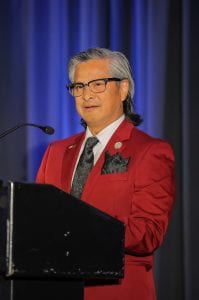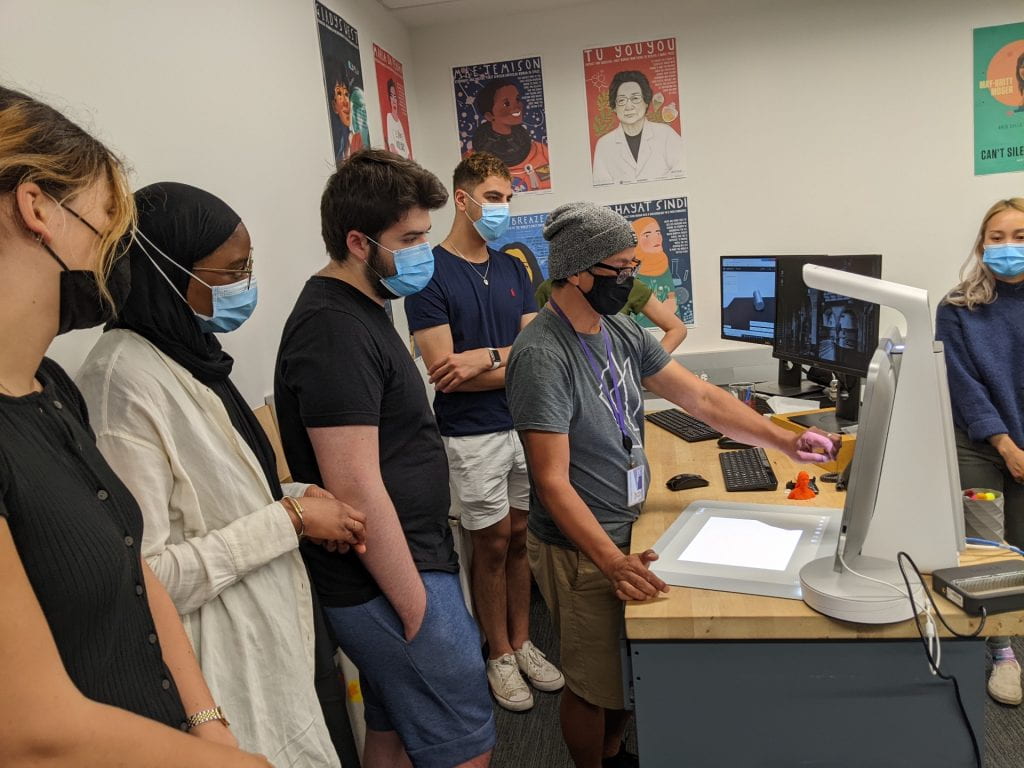Sure, librarian Ted Quiballo was pleased to find out he had been named one of 10 winners of an annual recognition from the American Library Association, something called the “I Love My Librarian Award.” But it wasn’t until he was ready to receive his honor at a Jan. 19 ceremony that he found out the award is kind of a big deal.
When he expressed shock that he was about to give an acceptance speech before a room of 6,000 ALA conference attendees, a fellow nominee told him, “Didn’t you know? These are the Oscars for librarians!”

Ted Quiballo accepts his “I Love My Librarian Award,” Jan. 19, 2024 Courtesy ALA
He didn’t know. But he sure does now, because the recognition made him an instant celebrity in ALA circles.
Quiballo manages the technology spaces at the Mudd Science and Engineering Library, including the MakerLab (a space that supports creative STEM activities such as 3D printing) and a video production studio. He and his nine fellow 2024 honorees — selected from more than 1,400 nominations of research, middle school, high school, and public librarians — received their honors at the ALA’s LibLearnX conference in Baltimore in January. The distinction came with a $5,000 prize and travel expenses to accept the award.
In the course of serving Northwestern students on campus, in local youth programs, and through Northwestern’s Prison Education Program, Quiballo has built a reputation for building community — a word that figured prominently in the 9-page nomination letter written by colleagues, student workers, and program partners who have watched him work first-hand.
“Ted actively seeks to represent underrepresented people in (the MakerLab),” wrote Learning Sciences PhD student Sarah Priscilla Lee, who worked with Quiballo on a summer program for refugee and asylum-seeking youth. “He understands that the most important part of making is building an inclusive community.”
Aliath Salami, an intern for that same program, wrote, “Ted is dedicated to his community and will do everything in his power to create a functional, impactful, and enjoyable experience even in a short amount of time.”
As Quiballo told the audience during his acceptance speech, “My community is the displaced and youth refugees that come to learn STEM activities. My community is incarcerated students who ask me to get resources for their physics papers. My community is different from your community, but your community expects nothing less of you as a librarian.”
Northwestern technology spaces are not unique to Mudd, but Quiballo insists the library’s iteration is special because it serves an interdisciplinary swath of students, from a theater major 3D-printing stage props to a robotics student recording a “light-painting” project using LED drones in the video studio. Then there’s his eagerness to open these spaces for programs serving local youth. In those cases, he’s not just teaching technical skills, he is — once again — building a community.
For example, when talking about the refugee student program that inspired Lee and Salami, among others, to pen his nomination, he pondered, “Do you think those kids cared about the STEM activities that they were learning? Not necessarily. They cared about learning English, because they spoke only Arabic and Pashto. What we cared about was people, rather than the project itself.”
And as his nomination letter reflected, Quiballo has a deft touch for making STEM experiences about acceptance, well-being, and comfort in unfamiliar settings.
Quiballo said he sees librarians as a group that has a great deal of privilege in the form of knowledge and access to resources that are not readily available everywhere.
“In that privilege, we have a responsibility to pay that forward to the communities that we directly impact,” he said. “And if we don’t know who those communities are, then that’s what outreach is for.”

Quiballo trains interns in 3D printing for a 2022 summer program
